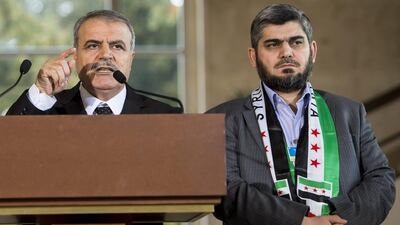Geneva // The Syrian opposition said on Tuesday there was no common ground with the government after more than a week of peace talks, accusing Damascus of renewing sieges and stepping up barrel bombings on civilians.
“We are not finding any common ground in the paper submitted by the government to UNspecial envoy [Staffan de Mistura],” said Asaad Al Zoubi, head of the main opposition council’s delegation.
He said the government had increased the number of sieges from 12 to 25 and stepped up a barrel bombing campaign over recent days.
A member of the High Negotiations Committee (HNC) opposition umbrella group also criticised the regime’s lead negotiator in Geneva, Bashar Al Jaafari, for using inflammatory rhetoric and blocking progress towards agreement on a political transition in the war-ravaged country.
But Hisham Marwa, who serves as a consultant in the HNC delegation taking part in the UN-brokered talks, said the regime position “will not affect our decision to be engaged in a political process, and to show a higher degree of responsibility and patience.”
His comments came after Mr Al Jaafari on Monday once again branded the opposition as foreign-backed terrorists and reiterated that any discussion of Assad’s fate was “excluded”.
He also stressed though that Damascus was committed to the peace process, and that his delegation had “clear instructions from our leadership to engage seriously in these talks.”
Mr Al Assad’s fate has been a key obstacle in the latest talks aimed at ending Syria’s devastating five-year war, which has killed more than 270,000 people and displaced millions.
“The government delegation continues to avoid discussing deadlines and is simply trying to get a rise out of the opposition,” Mr Marwa said, reiterating the HNC position that any discussion of leaving Assad in power is “absolutely unacceptable.”
“A political transition means creating a new authority.., including the powers of the presidency,” he said.
The apparent impasse on the crucial issue of forming a transitional Syrian government came during a second week of peace talks in Geneva, with Mr de Mistura eager to make gains before negotiations pause on Thursday.
Speaking to reporters on Monday evening, Mr de Mistura said he asked Mr Al Jaafari how Damascus defined the term political transition.
“He said, it was ... premature to talk about it. My message was ‘premature’ means imminent as far as we are concerned,” de Mistura said.
While conceding that progress remained slow, de Mistura stressed it was vital that opposing sides reach a basic understanding on how to move to a second round, tentatively scheduled for next month.
“I have been reminding everyone that there is no Plan B,” the UN envoy said.
The comments came as the head of Lebanon’s Hizbollah vowed his Shiite movement would keep fighting alongside the regime until ISIL was defeated.
“All that has been said about our withdrawal from Syria is false,” Hizbollah’s leader Hassan Nasrallah told Lebanese channel Al Mayadeen on Monday.
“We went to Syria to help keep the country from falling into the hands of Daesh and Al Nusra Front ... So long as we have a responsibility to be there, we will be there.”
Hizbollah first announced it was fighting alongside Assad’s troops in 2013 and has since sent thousands of fighters to battle Syria’s rebels, who are backed by Saudi Arabia and a US-led coalition.
*Reuters and Agence France-Presse

